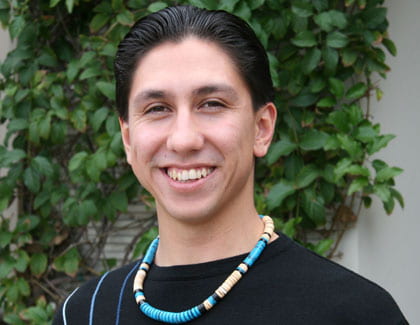Spirit catcher (1)
Alumnus Nikishna Polequaptewa directs new program to connect American Indian students to campus

Belonging to the badger and spider clans of the Hopi Tribe has always been a source of pride to Nikishna Polequaptewa ’05, perhaps because he knows what it’s like to be alone – to feel like he’s in a tribe of one. His mother left home when he was a baby. His father went to prison when he was 3. He lived in foster homes or with relatives on and off the Arizona reservation.
“Even though I moved around, I always knew my American Indian identity,” Polequaptewa says. “I always felt closely tied to my reservation, my tribe and its customs.”
Today, as director of the campus’s new American Indian Resource Program, he works to instill the same sense of pride and belonging in American Indian students at UCI as well as at elementary and high schools throughout Southern California.
“I want American Indians to have the kind of role models and resources I didn’t have,” he says.
Established by Student Affairs, the program aims to increase the number of American Indian students on campus (currently about 100) through K-12 outreach, and to serve the population now on campus and graduates.
Projects include a FIRE Mentorship Program to encourage American Indian high school students to attend college, summer academies to introduce high school and transfer students to life at UCI, and an Anteater Bridge program to start American Indian students in grades 6-8 on the path to academic success. Polequaptewa also organizes on-campus events to spread awareness about American Indian issues and customs.
“We want to create an American Indian presence on campus and in the community,” he says. “It makes American Indian students feel less alone.”
Polequaptewa knows firsthand the importance of outreach. While attending Sherman Indian High School, a boarding school in Riverside, he participated in UCI’s American Indian Summer Institute in Computer Science residential program and the California Alliance for Minority Participation, a summer program that prepares incoming freshmen for UCI. The programs gave him the mentors – spiritual guides – he needed.
“I’ve always known I’d go to college, even though I had no parents or way to pay for it. I did it by doing the best I could at school,” he says. He enrolled in UCI’s information & computer science program, switching majors in his fourth year to environmental analysis & design to “build things that help people directly.”
“College was difficult. I had a lot of extra stress because there were so few American Indian students.”
He served as president of the American Indian Student Association all four years, with only a few active members to help with projects such as tutoring American Indian high school students, expanding American Indian summer programs, staging the annual UCI powwow in June and presenting workshops to elementary and middle school children to “let them know the culture’s still alive.”
After graduating, he earned his master’s in resource management from Central Washington University, then developed an air-monitoring program for the La Jolla Band of Luiseño Indians. He returned to UCI in October after Manuel Gómez, vice chancellor of Student Affairs, supported his proposal for the program.
Polequaptewa runs the program out of The Center for Educational Partnerships, which provides office space, support and supplies, and hopes to someday establish a permanent center. His wife, Yolanda Leon, serves as program coordinator, and they have a young daughter. His tribe is growing.
He hopes the program will become a model for the entire UC system, helping students like him who have little support.
“I grew up with nothing and I made it. I want other American Indian students to know they can make it, too.”